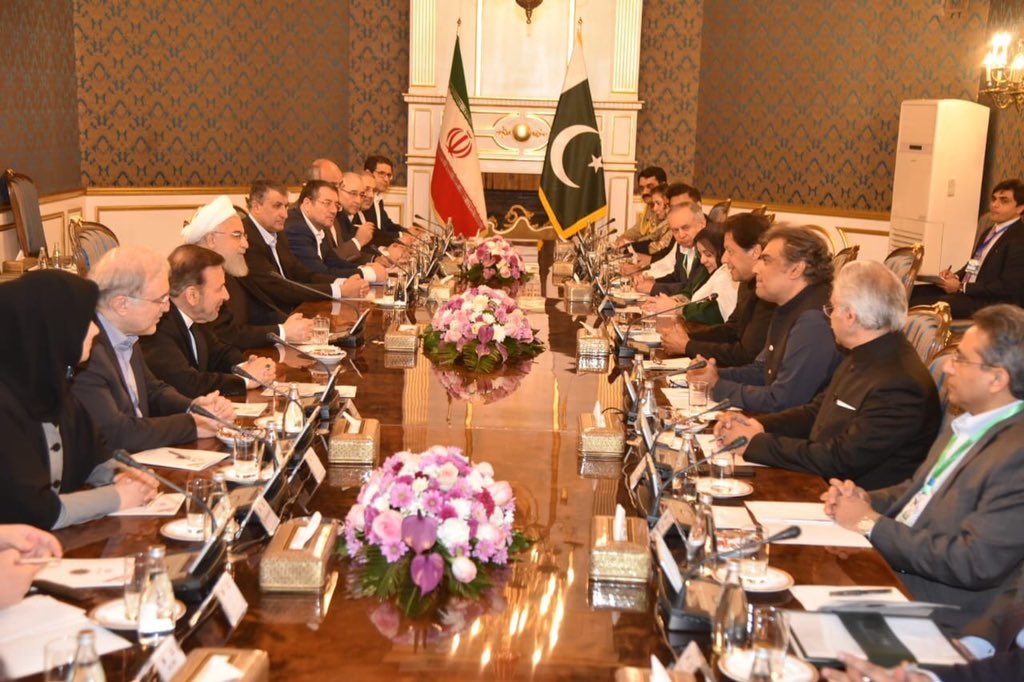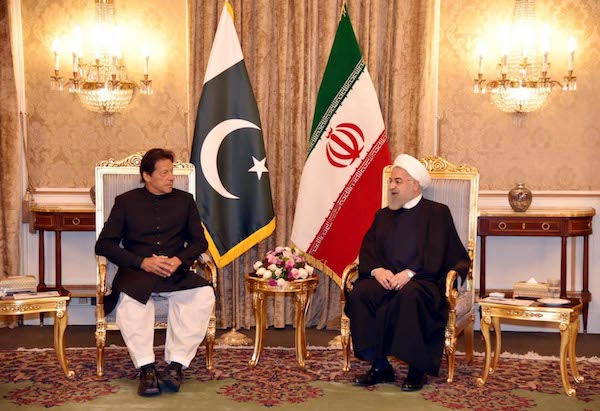Prime Minister Imran Khan’s visit to Iran was overdue; this was his first visit since assuming office in August 2018. The core purpose of the visit was to fortify Pak-Iran relations. Talks helped ease tensions as the two countries agreed on a raft of measures to deal the problem of terrorism that has affected both sides in recent months. Both sides agreed to expand relations in all areas of mutual interest and reiterated the importance of deepening and reinforcing bilateral ties based on of I mutual respect or national sovereignty. They called for swift implementation of bilateral agreements as a step towards realising this important goal. Even though the summit touched all contentious issues, a concrete outcome would depend on how both sides implement the agreed upon understandings on the ‘way forward’.
Relationship between the two countries was tense since a terrorist attack in Iran killed scores of Iranian Revolutionary Guards. Earlier, a banned militant organisation had abducted 12 Iranian border guards in October 2018 from Iran’s Sistan Baluchistan province. Five of the guards were released in November. While Tehran suspected Pakistan based groups for these incidents, Islamabad had also lodged a protest with Tehran after a recent attack on a coastal highway in which 14 security personnel were brutally gunned down by an alliance of Baloch terrorist outfits. A day before the premier’s visit, Pakistan had said the Ormara attack had originated from Iran.
Prime Minister Imran raised the issue with the Iranian leadership with a hope that such groups would not be allowed to carry out attacks in future. Imran Khan admitted that the issue of terrorism was under-mining cooperation between the two countries. “The issue of terrorism is increasing differences between us,” he said adding, “We have suffered more than any other country” Highlighting the common threat facing the two countries, he acknowledged that some of the groups which carried out attacks inside Iran were operating from Pakistan.
However, he made it clear that Pakistan would not allow its territory to be used against any neighbour, including Iran. “We will not allow any militant group to use our soil against anyone. Both countries will not allow any other to use their soil for terrorist activities”. He further said that there was a political consensus in Pakistan that terrorist groups have no place in the country. His bold statement created some controversy back home with certain people questioning the wisdom behind publicly admitting the presence of anti-Iran groups in Pakistan.
In the past, “some terrorists did some attacks,” Iran’s President Rouhani said vowing not to allow ‘third party’ to undermine ties between the two countries. “This will build confidence between us,” Imran Khan said. Speaking at a joint news conference with Pakistani premier, the Iranian president announced: “We have agreed to expand our security cooperation in border areas and also agreed to set up a rapid action force to tackle it.” Iran and Pakistan share almost 1000 Km border, so the importance of tenable border management cannot be attached a low priority.
Economic activity is accelerating in the region due to CPEC project. Gwadar port is emerging as the biggest port in entire region and Iran being the neighbour has a lot to gain from evolving economic opportunities. Besides CPEC, the other major project is Iran-Pakistan pipe line; both projects are mutually complementary. Considering the importance of developing connectivity and transit corridors in order to accelerate and facilitate bilateral and regional cooperation and trade, both sides welcomed the implementation of bilateral and multilateral agreements including the Belt and Road Initiative (BRI) and China-Pakistan Economic Corridor (CPEC), as well as agreements on establishing the North-South and East-West corridors in Iran.
Bilaterally, the two sides exchanged views on issues related to Pakistan-Iran border security, facilitation of Pakistani pilgrims travelling to Iran in large numbers, over-coming hindrances in promotion of bilateral trade and economic activity, opening of new border crossing points, establishment of new border market, enhancing cooperation in energy, consular, health, and railways sectors and promotion of cultural collaboration, tourism and people to people exchanges between the two countries.
The Prime Minister also addressed the Pakistani and Iranian business community and highlighted the need for private sector’s proactive role in realizing the full potential of bilateral trade and economic relations.

The two sides issued a comprehensive Joint Statement outlining the outcome of the summit. The salient features of the Joint Statement are Signing of Declaration for Cooperation in Healthcare Sector; Pakistan welcomed the initiation of the process for release of a number of Pakistani prisoners by the Government of Iran and their repatriation to Pakistan Next meeting of the Joint Consular Commission to be held in Islamabad in 2nd half of 2019; 10th round of Security Committee to be held in Islamabad in June 2019; 2nd round of High Border Commission in Islamabad in May 2019; 21st round of Joint Economic Commission (JEC) in Islamabad in 2nd half of 2019; Next round of Joint Committee on Trade to meet in Islamabad in first week of July 2019; Early opening of new crossing points at Gabd-Reemdan and Mand-Pishien and agreement in principle on opening of new border market to be discussed during the High Border Commission; Agreement to promote broader regional consensus on an Afghan-owned, Afghan led peace process and an amicable solution; And, call for peaceful solution of Jammu &Kashmir dispute based on the will of the Kashmiri people and in line with the UNSC Resolutions.
While emphasizing historical, cultural, religious and civilizational ties between the two countries and highlighting the commitment of their senior officials to expand relations in all areas of mutual interest, the two sides reiterated the importance of deepening and reinforcing bilateral ties based on principles of national interest, territorial integrity and mutual respect for national sovereignty. They called for swift implementation of bilateral agreements as a step towards realizing this important goal.
Both sides underscored that common borders should be the borders of peace and friendship, and acknowledged the necessity of forging regular cooperation and exchange of views between political, military and security officials of the two countries to combat threats such as terrorism, smuggling of narcotics, human trafficking, hostage-taking, money-laundering and abduction.
The Pakistani side extended its appreciation to the Government of the Islamic Republic of Iran for continuing electricity exports to Pakistan’s Balochistan Province. Both sides reaffirmed the need to further strengthen these bonds through promotion of academic, cultural and tourism activities, particularly by encouraging more frequent exchange of visits of intellectuals, folk artists, cultural troupes and by enhancing tourism to the historic religious sites in both countries.
Prime Minister Imran Khan reaffirmed the support and solidarity of the government and people of Pakistan with the people of Iran over loss of precious human lives and material damages due to recent severe floods in Iran. He expressed the conviction that the people of Iran would handle this natural calamity with their characteristic resilience. The Iranian side expressed its gratitude to Pakistan for sending humanitarian assistance to the flood affected people in Iran. Both sides welcomed the signing of a declaration for cooperation in health sector aimed at bilateral technical assistance and experience sharing with tangible outputs. Considering the increase in volume of trade in 2018, the two sides instructed relevant institutions and Ministries to devise all required mechanisms for boosting monetary, financial and commercial activities to their full potential by utilizing all available options. Both sides discussed and exchanged views on major regional and international issues, and asserted that peace, tranquillity and sustainable development are prerequisite for enhancing relations, integrity and synergy.

Referring to the necessity of establishing a safe, stable and independent Afghanistan for the sake of regional peace and stability, the summit acknowledged the necessity of holding Afghan-led and Afghan-owned peace dialogue while calling upon regional countries and the international community to work collectively to end conflict and restore complete peace in the country. Both sides agreed to join hands for promoting efforts for peace in Afghanistan. Khan said the four decades of war in Afghanistan had affected both Iran and Pakistan “There are 2.7 million Afghan refugees in Pakistan and 3 million in Iran”, he added. Both sides also agreed to join efforts for achieving a broader regional consensus in this regard.
While condemning terrorism in all its forms and manifestations, both sides acknowledged the great achievements of the two countries in combating terrorism and emphasized that efforts to develop regional and international cooperation in preventing and countering terrorism should be redoubled and the root causes of all types of terrorism in the region identified and addressed.
Both sides highlighted the need to resolve the issue of Jammu & Kashmir through dialogue and peaceful means based on the will of the people and in line with the resolutions of the United Nations Security Council. Leaders also emphasized that the right of the people of Palestine to establish an independent and sovereign Palestinian state should be respected as the key demand of the Muslim states. Both sides also agreed to reinforce endeavours through regional and international arrangements and mechanisms to help Palestinians establish an independent state.
Both sides stressed on swift and complete implementation of the Joint Comprehensive Plan of Action (JCPOA) by other states affirming full compliance of Iran to its provisions. Pakistan has always maintained its principled stance that JCOPA is a UN approved international treaty and all parties to the treaty must fulfil their treaty obligations.

The growing relations of Iran with India have many a times raised eyebrows in Pakistan, but in all probability, relations between the two countries have never been and will never evolve into an anti-Pakistan nexus.
Iran also needs to understand that there is increasing awareness about persistent Iranian involvement, alongside Saudi Arabia, in fanning and sustaining sectarian tensions in Pakistan. Indeed, Pakistan has become yet another playfield for Saudi-Iran struggle for propping up their respective versions of Islam.
There has been regular exchange of leadership level visits between the two sides in recent years. These visits have strengthened ties between two countries on all accounts. Iran is an important Muslim neighbour having centuries old people to people, religious and cultural affinities with Pakistan. Imran Khan’s first leadership level interaction has enabled strengthening of the mutual understanding on important issues in bilateral, regional and international domains.
International politics are evolving at a rapid pace and the power equation has begun to transform from a unipolar hegemony to multipolar entities. The phenomenon is furnishing more space for regional players, who too now have a greater role to play in shaping their regional scenario. Under this scenario, strong ties between Iran and Pakistan are crucial for regional stability.
Economy and diplomacy are two key areas to immediately focus upon. Crisis handling needs further attention, resorting to harsh statements on the media on onset of any crisis are not likely to be fruitful. Iran and Pakistan are very important countries in South Asia, and without involving the two, regional issues would not stand resolved. There is need of increased cooperation between Iran and Pakistan this would not only benefit the two countries directly but will also play a vital role in ensuring regional peace and stability.
Pakistan and Iran have remarkable resilience and perseverance to get along even during dry patches. Despite the presence of third-party trigger-able potent fault lines, national leadership of both countries is always forthcoming and accommodative in crisis management. This said, both countries need to join hands, put their act together to tackle the ethno-sectarian factor quickly and effectively. It can no longer be accepted as a new normal, tentacles of the menace are multi-pronged and it has the potential of consuming decades of good-will investment by the two sides.
There is plenty of turf for a win-win cooperation. To capitalize on this, Pakistan has to take result-oriented steps to allay Iranian reservations on cross border violence and Iran has also to assuredly demonstrate that it is not, wittingly or unwittingly getting sucked into India’s multi-dimensional anti-Pakistan campaign.





